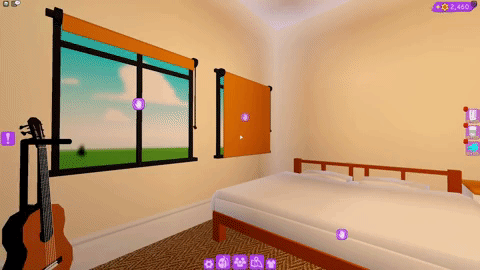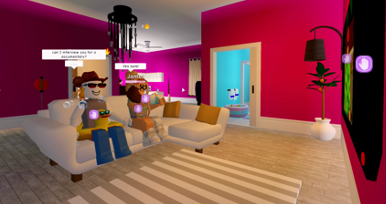It starts as a standard ethnography: the researcher and videographer team enter the home of the participant. Tiffany (US-based gamer and mother of one) begins the grand tour: her kitchen, tastefully decorated to modern design standards; the desk and laptop where she sits down to work on sunny afternoons; the bedroom where she hangs out with her 10 year old son. Tom, the videographer, lost in curiosity, says: “I’m just testing out the bed” in intrigue to this new environment as he climbs into her bed.

Unexpectedly, this gesture is met with awkward silence. The team are meeting Tiffany in her home built inside the video game Roblox – modelled almost entirely on her ‘real life’ home. Tom had never climbed into bed on a shoot before. This moment revealed just how real the game is to Tiffany, and how climbing into her bed was just as inappropriate as it would have been in any setting. The incident marks a substantial shift in how the virtual environment should be viewed: for Tiffany, this is not just a game, but very much part of her personal space – an extension of her reality.
This begs the question: do the same rules of ethnography and filmmaking apply in a virtual world? The answer is certainly “Yes!” But this environment is novel and new, and the possibilities are only just emerging.
With a deep history of merging ethnography and creativity to make human truths travel through organisations, global insights agency BAMM embraces how new technologies can feed into qualitative research and holistic understandings of the human experience.
The pandemic has undoubtedly thrown a spanner in the insights industry’s ability to conduct ethnographies, with most agencies relying on mobile and online platforms. As we teeter on the edge of anticipation for the “return to f2f”, virtual in-game ethnography is a strong reminder of the power and magic of ethnography in a year that has been largely devoid of it.
Cued by the exponential growth of the gaming industry in both audience and revenue in recent years (an audience predicted to reach over 2.8 billion in 2021, meaning 1 in 3 people are gaming!), BAMM explores the modern gaming experience through in-game interviews, Twitch, Discord, OBS, QuickTime, 360 capture, screen sharing and Zoom. This ‘fourth wave’ of gaming (driven largely by the pandemic, people being inside and online, and a great democratisation of technology) has given us more sophisticated ways to engage with people than ever before.
The exploration reveals new and interesting ways to do research. Ever had an IDI in outer space? Or gone in-field on an island? The magic of ethnography lies in tailoring an approach to the individual and their cultural environment – an easy feat virtually. BAMM employ a mix of interview and recording setups to match the experience of each gamer. UK-based game developer Maciek Strychalski invites us for “a chat” in his “space junker” inside Star Citizen. Gamer and artist Aliyah Art invites us to her favourite place – her Animal Crossing: New Horizons island, inspired by a trip to Japan. Freedom of choice in the location creates a rich starting point to understanding what really matters to somebody.
Ethnographic methods are rooted in understanding people within their cultural setting and how they interact with their environment. Much emphasis is placed on the effect of the researcher. Meeting players inside the game, as well as observing the physical space around them, has the power to unlock more – the researcher is seeing and experiencing this experience live with them – both from the POV of the team and the POV of the participant.
“For some reason we are addicted to seeing our reality through a different lens, or an amplified lens, or just another lens than our own eyes.” PippenFTS, YouTuber and gamer, said during an interview inside Minecraft and tour of his ‘Build the Earth’ project.

In-game research allows the observer to become a microcosm of this, literally seeing through the lens of the participant’s eyes. It allows an ethnographer to experience what participants are unable to articulate. The ability to capture their own awareness, where their attention is focused, is like a more sophisticated version of sticking a GoPro on their head.
To capture a social engagement, traditional research might involve triads recruiting a participant plus 2-3 friends in a bar. In instances where the researcher is an outsider, a level of research effect will naturally come into play. In-game interviews provide an opportunity for their friends to join and hangout, whilst the video game interface and familiarity creates an invisibility cloak for BAMM to blend in and become part of the world. Gaming is a democratised space, where demographics matter less. The researcher is by default more anonymous, thereby diminishing the researcher effect.
For Sabine (an anthropologist, writer and gamer based in the US) meeting her friends in a Red Dead Redemption saloon reveals a safe space to explore actions without consequence – for Sabine and Co. to behave in ways they’d likely refrain from in a ‘real’ bar. Meeting Alex (a UK-based gamer and social worker) and his friends in Call of Duty: Warzone, a level of natural banter unravels quickly and organically, allowing the team to uncover deep insights around the social behaviours and needs of in-game connection.

While the rules are yet to be set and fully understood, as gaming and the virtual space becomes increasingly real for people, in-game ethnography allows the research industry great ways to observe participants and material culture without research tasks risking feeling forced or contrived. Unfiltered and truly natural behaviours are just the beginning of the opportunity in this extension of people’s reality.


